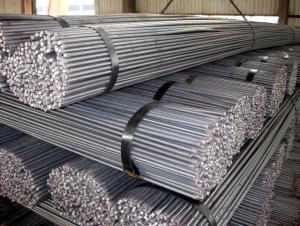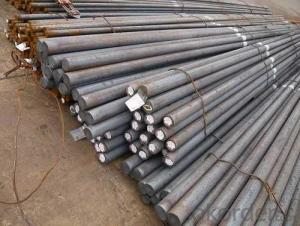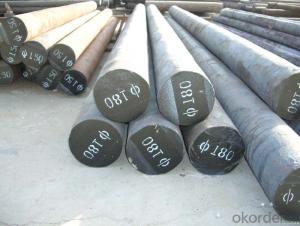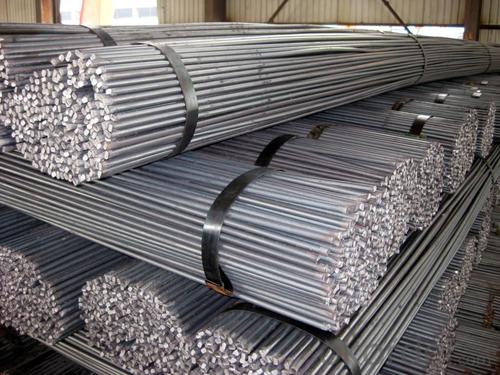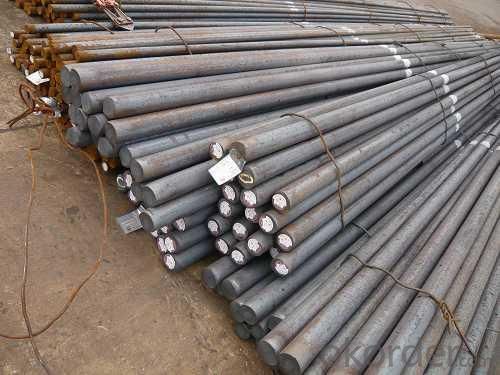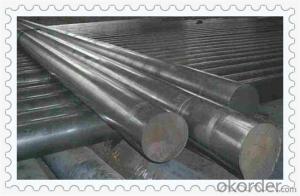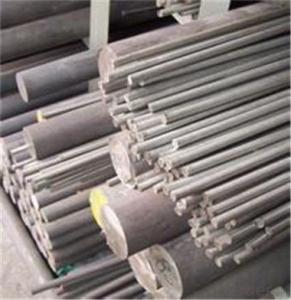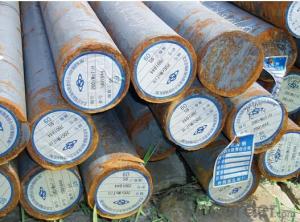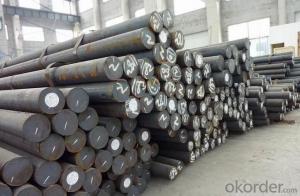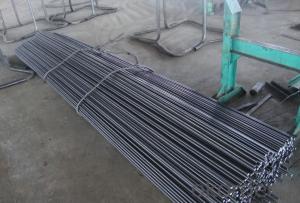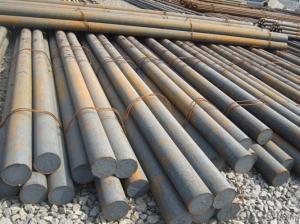Steel Round Bar 12L14 Cold Drawn Steel Bar /Free Cutting
- Loading Port:
- Tianjin
- Payment Terms:
- TT OR LC
- Min Order Qty:
- 25 m.t.
- Supply Capability:
- 40000 m.t./month
OKorder Service Pledge
OKorder Financial Service
You Might Also Like
Packaging & Delivery
| Packaging Detail: | Exporting packing or according to your special requirments. |
| Delivery Detail: | 30 days after comfirming or according to your quantity. |
Specifications
1. Grade:12L14, 1215
2. Size: Dia 0.2mm-16mm
3. Technique: Cold drawn
Next we introduce the products (12L14 Steel Bar)as follows
1. Steel grade: 12L14; SUM24L.
2. Diameter: 0.2mm-16mm.
3. Application: machinery, mechanical parts, instruments, auto parts and so on.
Other information of 12L14 Steel bar:
MOQ | 5MTS |
Payment Term | 30% TT prepayment, 70% against copy of B/L. Or L/C at sight
|
Delivery Time:
| 40 days after getting deposit.
|
Packing: | Exporting package or as customer’s requirement. |
Our website: | www.hengsteel.com
|
Chemical composition& Tolerance:
| Grade | |||||||
| AISI | JIS | C | Si | Mn | P | S | Pb |
| 12L14 | SUM24L | 0.15max | 0.15-0.35 | 0.85-1.15 | 0.04-0.09 | 0.26-0.35 | 0.10-0.35 |
| S25CL | 0.22-0.28 | 0.15-0.35 | 0.30-0.6 | 0.03max | 0.035max | 0.10-0.35 | |
| S45CL | 0.42-0.48 | 0.15-0.35 | 0.60-0.9 | 0.03max | 0.035max | 0.10-0.35 | |
| 1215 | SUM23 | 0.09max | 0.75-1.05 | 0.04-0.09 | 0.26-0.35 | ||
| SUN25 | 0.15max | 0.90-1.40 | 0.07-0.12 | 0.30-0.40 | |||
| Tolerance grade: | |||||||
| h8 | h9(Round bar) | h10(Hexagonal bar) | h11 | h12 | |||
| <3mm | 0-0.014 | 0-0.025 | 0-0.040 | 0-0.060 | 0-0.10 | ||
| 3-6mm | 0-0.018 | 0-0.030 | 0-0.048 | 0-0.075 | 0-0.12 | ||
| 6-10mm | 0-0.022 | 0-0.036 | 0-0.058 | 0-0.090 | 0-0.15 | ||
| 10-18mm | 0-0.022 | 0-0.043 | 0-0.070 | 0-0.11 | 0-0.18 | ||
| 18-30mm | 0-0.033 | 0-0.052 | 0-0.084 | 0-0.13 | 0-0.21 | ||
If you have any demands abou steel products, pls don't hesitate to contact us.We look forward to built business relationship with you.
Product Picture:
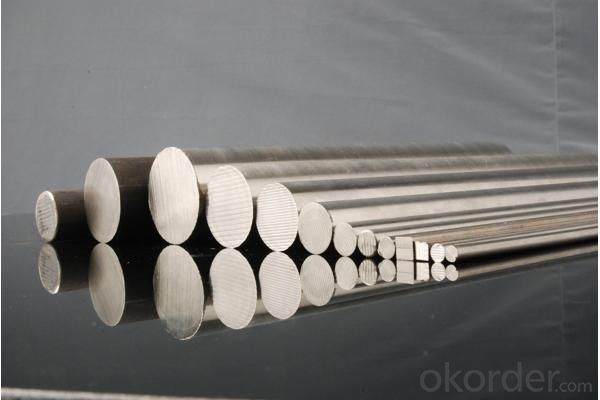
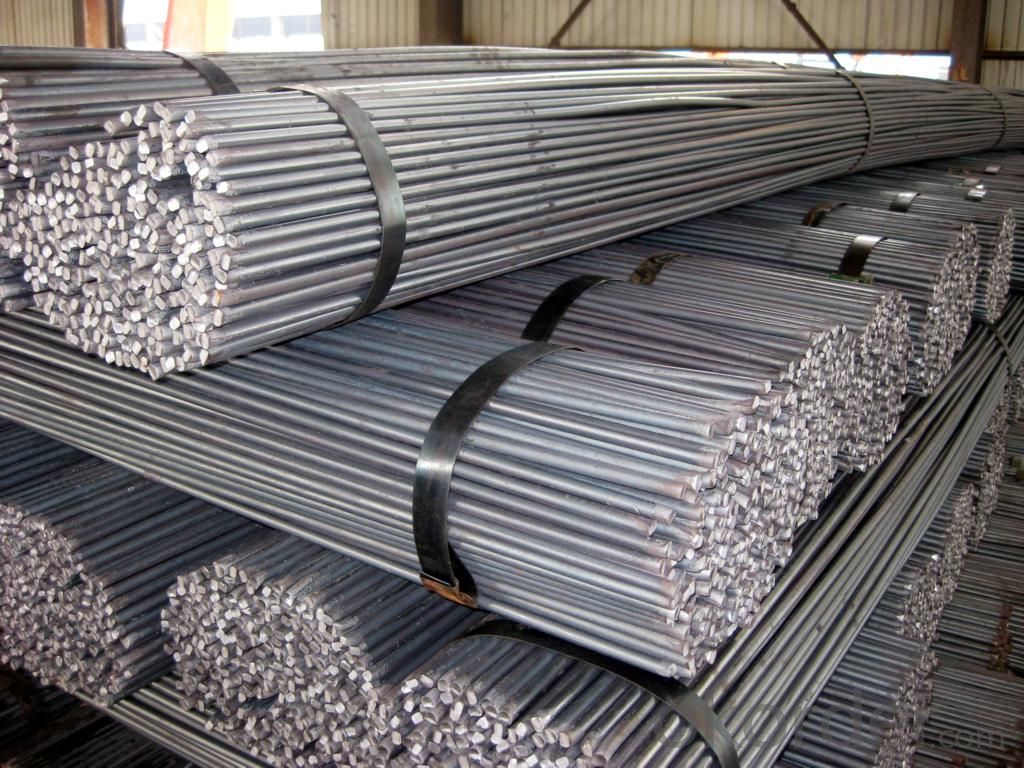
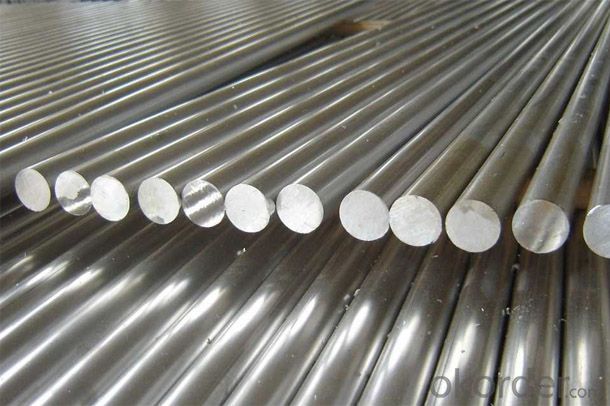
- Q: What are the different surface treatments available for tool steel round bars?
- There are several surface treatments available for tool steel round bars, which are used to enhance the performance, durability, and overall quality of the steel. Some of the common surface treatments for tool steel round bars include: 1. Nitriding: This process involves exposing the tool steel to a nitrogen-rich environment at high temperatures. It forms a hard surface layer that improves wear resistance and reduces friction. 2. Coating: Tool steel round bars can be coated with various materials such as titanium nitride (TiN), titanium carbonitride (TiCN), or chromium nitride (CrN). These coatings provide excellent resistance to wear, corrosion, and heat. 3. Black oxide: It is a chemical treatment that forms a black oxide layer on the surface of the tool steel. This treatment improves corrosion resistance and reduces the risk of rusting. 4. Heat treatment: Tool steel round bars can undergo heat treatment processes such as annealing, tempering, or quenching. These treatments help to improve the hardness, strength, and toughness of the steel. 5. Surface grinding: This process involves removing a thin layer of material from the surface of the tool steel. It helps to achieve a smooth and polished surface, enhancing the aesthetics and reducing the risk of surface defects. 6. Shot peening: It is a process where small metal or ceramic particles are propelled onto the surface of the tool steel at high velocity. This treatment induces compressive stress, improving the fatigue resistance and extending the lifespan of the steel. 7. Electropolishing: This treatment involves immersing the tool steel in an electrolyte bath and applying an electric current. It helps to remove surface imperfections, enhance the surface finish, and improve corrosion resistance. These surface treatments can be chosen based on the specific requirements and applications of the tool steel round bars. Each treatment offers unique benefits and can significantly enhance the performance and longevity of the tool steel.
- Q: What is the yield strength of a steel round bar?
- The yield strength of a steel round bar can vary depending on the specific grade and type of steel used. However, common structural steel grades have yield strengths ranging from 250 MPa to 800 MPa.
- Q: What is the maximum length of a steel round bar that can be manufactured?
- Several factors determine the maximum length of a steel round bar that can be produced. These factors include the bar's diameter or thickness and the limitations of the manufacturing process. Steel round bars typically range in length from a few feet to several hundred feet, or even longer. However, it is worth noting that as the bar's length increases, maintaining its straightness and dimensional accuracy becomes more challenging. This is especially true for thinner or larger diameter bars, as they are more prone to bending or warping during manufacturing. Moreover, logistical constraints such as transportation and handling can also impose limitations on the maximum length of a steel round bar that can be efficiently manufactured and delivered. Therefore, the maximum length of a steel round bar that can be produced is not a fixed value. Instead, it depends on various factors related to the specific requirements, capabilities, and limitations of the manufacturer, as well as the intended application for the bar.
- Q: What is the maximum vanadium content allowed for steel round bars?
- The allowed vanadium content in steel round bars varies depending on the specific steel grade and industry standards, with different regulations or customer requirements for different steel grades and applications. Vanadium is commonly used as an alloying element in steel to enhance its strength, hardness, and corrosion resistance. Generally, the maximum vanadium content in steel round bars falls between 0.02% and 0.25%. To determine the maximum allowed vanadium content for steel round bars, it is essential to consult the relevant standards and specifications for the specific steel grade and application.
- Q: What are the advantages of using case-hardening steel round bars?
- Case-hardening steel round bars offer several benefits for various applications. To begin with, these round bars possess a toughened outer layer, known as the "case," while maintaining a softer and more malleable core. This unique combination allows for exceptional surface wear resistance, making them highly suitable for situations where the material encounters abrasive or erosive forces. Furthermore, the hardened outer layer enhances the overall strength and durability of the round bars, thereby extending their lifespan. Another advantage of case-hardening steel round bars lies in their remarkable ability to withstand heavy impact loads. The hardened outer layer acts as a protective barrier, effectively absorbing and dispersing the energy from impacts, thus preventing any deformation or breakage. This makes them particularly well-suited for applications involving substantial loads or impacts, such as in the fields of machinery or construction equipment. Moreover, case-hardening steel round bars provide enhanced resistance against fatigue. The hardened surface layer aids in distributing stresses evenly, reducing the likelihood of cracks or fractures developing during cyclic loading conditions. Consequently, they prove to be an excellent choice for applications that demand long-term durability and the ability to withstand repeated stress, such as in automotive components or gears. Additionally, these round bars demonstrate excellent machinability. The soft and malleable core allows for easy cutting, drilling, and shaping, while the hardened surface ensures the necessary wear resistance. This aspect makes them both cost-effective and efficient to work with, enabling them to be effortlessly molded into various shapes and sizes to meet specific design requirements. In conclusion, the utilization of case-hardening steel round bars offers a plethora of advantages, including outstanding wear resistance, high impact load resistance, improved fatigue resistance, and excellent machinability. These characteristics render them a versatile and dependable choice for a wide array of applications across industries such as automotive, construction, and manufacturing.
- Q: What are the advantages of using precipitation-hardening steel round bars?
- Using precipitation-hardening steel round bars in various applications has several advantages. Firstly, these bars provide exceptional strength and hardness, making them suitable for industries that require robust and durable materials. The precipitation-hardening process involves heat treatment, which enhances the steel's strength and resistance to wear, deformation, and fatigue. Secondly, precipitation-hardening steel round bars exhibit excellent corrosion resistance. This makes them ideal for applications in marine environments or industries where exposure to harsh chemicals or corrosive substances is common. The steel's resistance to corrosion ensures the longevity and reliability of components or structures made from it. Another advantage is the versatility of these bars. They can be easily machined, welded, and forged, allowing for flexibility in design and fabrication processes. This makes them suitable for a wide range of applications, including aerospace, automotive, construction, and oil and gas industries. Furthermore, precipitation-hardening steel round bars offer good dimensional stability. Their low rates of thermal expansion mean they retain their shape and size even under extreme temperature variations. This characteristic is particularly important in precision engineering or tool manufacturing, where dimensional accuracy and stability are crucial. Lastly, the availability of a wide range of grades and sizes of precipitation-hardening steel round bars makes it easier to find the most suitable option for specific requirements. Different grades offer varying levels of strength, toughness, and corrosion resistance, allowing for tailored solutions to meet different application needs. Overall, the advantages of using precipitation-hardening steel round bars include exceptional strength, corrosion resistance, versatility, dimensional stability, and availability in various grades. These advantages make them the preferred choice for many industries requiring high-performance and durable materials.
- Q: Can steel round bars be used in the manufacturing of mining equipment?
- Mining equipment manufacturing often incorporates steel round bars due to their strength, durability, and versatility. These bars are commonly utilized in the construction industry, as their ability to be machined, welded, and fabricated into various shapes and sizes makes them the ideal choice for mining equipment. Components such as shafts, axles, gears, and structural supports in mining machinery can all be manufactured using steel round bars. Moreover, their ability to withstand heavy loads and harsh environments makes them the perfect fit for rugged mining conditions. Furthermore, heat treatment can be applied to steel round bars to enhance their mechanical properties, making them even more suitable for the manufacturing of mining equipment.
- Q: Can steel round bars be used in the manufacturing of machinery?
- Certainly, machinery manufacturing can make effective use of steel round bars. Various industries commonly employ steel round bars due to their robustness, longevity, and adaptability. These bars frequently serve in the fabrication of essential components like shafts, axles, gears, and other mechanical parts that necessitate exceptional strength and resistance against deterioration. Notably, steel round bars exhibit remarkable mechanical properties, encompassing impressive tensile strength and superior machinability, rendering them highly suitable for heavy-duty machinery and equipment. Furthermore, steel round bars can be conveniently welded, forged, or machined into the desired configuration, thus establishing them as a preferred option for machinery manufacturing.
- Q: What is the cost of a steel round bar?
- The cost of a steel round bar can vary depending on several factors such as the size, grade, and supplier. Generally, the larger the diameter and length of the round bar, the higher the cost. The grade of steel also plays a significant role in determining the price, as different grades have varying levels of strength and durability. Additionally, the supplier and location can impact the cost due to factors like transportation and market demand. To get an accurate cost estimate, it is best to contact a local supplier or check online metal marketplaces for current prices.
- Q: How do steel round bars perform under impact or shock loading?
- Steel round bars generally perform well under impact or shock loading due to their high strength and toughness. The inherent properties of steel, such as its ability to absorb and distribute energy, make it highly resistant to deformation or failure when subjected to sudden forces or impacts. Additionally, the uniformity and reliability of steel's microstructure contribute to its consistent performance and durability in such loading conditions.
Send your message to us
Steel Round Bar 12L14 Cold Drawn Steel Bar /Free Cutting
- Loading Port:
- Tianjin
- Payment Terms:
- TT OR LC
- Min Order Qty:
- 25 m.t.
- Supply Capability:
- 40000 m.t./month
OKorder Service Pledge
OKorder Financial Service
Similar products
Hot products
Hot Searches
Related keywords
